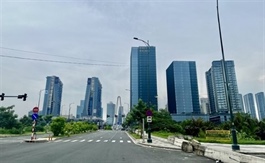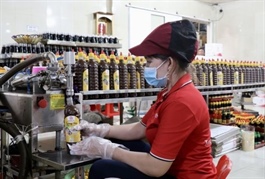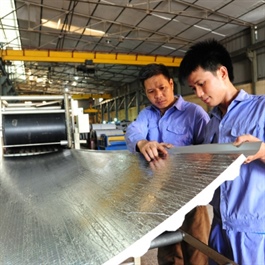Firms propose Vietnam gov’t stimulate demand, lower loan interest in 2024: survey
Firms propose Vietnam gov’t stimulate demand, lower loan interest in 2024: survey
Businesses have suggested that the Vietnamese government continue cutting lending interest rates to help boost demand and expand markets to facilitate their operations for the rest of the year, given the country’s impressive GDP growth of 6.42 percent in the first half of this year, a survey has revealed.

Shoppers at a supermarket in Ho Chi Minh City. Photo: Quang Dinh / Tuoi Tre |
The General Statistics Office of Vietnam (GSO) recently conducted a survey of 30,000 enterprises to evaluate the overall business situation across the country in the second quarter and collect proposals from companies on how to boost operations in the second half of this year, a GSO representative said.
The survey's results were released along with the GSO’s publicization of the economic outcomes achieved by the country over the first six months, including a GDP growth rate of 6.93 percent for the second quarter and 6.42 percent for the first half of 2024.
Survey results showed that despite the impressive economic growth, most businesses said that they have faced numerous difficulties.
As much as 53.8 percent of the enterprises said they have been challenged by low domestic market demand.
Over the January-June period, 119,600 enterprises registered a new business or resumed operations, while 110,300 others, or nearly 18,400 per month, withdrew from the market, the GSO said.
The dampened domestic market demand and tough competition were pinpointed as the two factors that have most affected production and business activities of enterprises over the past months, said Phi Thi Huong Nga, director of the GSO’s Department of Industrial and Construction Statistics.
Specifically, 43.6 percent of the enterprises said the competition for sales of goods and services in the domestic market is increasingly fierce, posing great difficulties in seeking outlets for their products.
According to Nga, 46.9 percent of the construction enterprises faced difficulties due to a lack of new construction contracts.
Some 27.4 percent of the businesses surveyed said they met with challenges due to the hikes in prices of raw materials, fuel, and other input materials, as well as in charges for transportation, warehousing, and other services.
In addition, 21.2 percent of the respondents found it hard to access loans for business operations, and 19.7 percent lamented that lending interests, despite recent cuts, remained high.
About 18.1 percent of the businesses said they have struggled with shortages of raw materials and fuel for production, while 14.7 percent said that administrative procedures, business conditions, and bidding processes were still complicated and overlapping, considerably affecting production and business activities.
Forty-seven percent of the respondents wanted the government to continue reducing lending interest and 29 percent recommended easing loan conditions and procedures to help them access more credit sources and cut loan expenses.
About 27.7 percent said government agencies should deploy measures to stimulate domestic consumption demand, while 21.4 percent asked for support in trade promotion and market expansion.
Some 30.5 percent asked the government to find solutions for maintaining the supply of raw materials and production inputs, while 35.4 percent emphasized the need to stabilize the prices of input factors, including raw materials and fuel."
Around 31.2 percent suggested that the government adjust policies on taxes, fees, and state budget payments to make them proper.
Dr. Nguyen Quoc Viet, deputy director of the Institute of Economic and Policy Research at the Vietnam National University-Hanoi, identified two factors directly impacting the consumption of goods by domestic enterprises.
Firstly, businesses and individuals have tightened their consumption and investment on account of concerns about economic growth prospects, which is reflected in the low credit growth index but a high amount of bank deposits in the first six months of the year.
Secondly, the strong development of e-commerce has allowed cheap goods from abroad, not just from China, to crowd out domestic products.
“Domestically produced goods have to compete with foreign commoditites of similar quality and design, even with those with slightly better quality but sold at much lower prices, from other countries, especially from China, on e-commerce platforms,” Dr. Viet said.
On Saturday, the National Assembly decided to continue reducing value added tax (VAT) by two percentage points for some groups of goods and services until December 31, 2024, in an effort to help stimulate consumption and support businesses in sales of products for the rest of this year.
However, many experts advised that the VAT reduction policy should be extended until the end of 2025 to effectively stimulate demand and promote sales.
Nguyen Bich Lam, former general director of the GSO, recommended that the reduction rate should be higher than two percentage points, if conditions permit, to make it more significant and stimulating for consumers to spend more on goods and services.




























